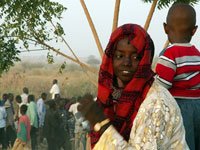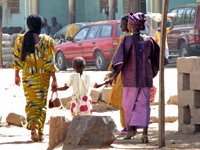I just read a
post today about a journalist in
Uganda who was coerced into paying a woman she had interviewed for an article although she felt it went against journalistic work ethics. At first she was reluctant, but her Ugandan colleague seemed to have valid point: ""You're going to get paid for the story, right?" In other words, "You should share."
Now, the question about donating money in Africa is a sensitive point. I know that a lot of people really want to help, and when you arrive as a Westerner in Africa, you are immediately struck by its lack of material wealth. You are almost disgusted by your own fortunate situation. Of course you want to do something and handing out money is the quickest way of settling your own conscience. At least you did something. You gave that person some money. You can go home with a sense of satisfaction.
But what happens then? What happens the next day and the day after that, when there is no one around to hand out that free cash that the receiver didn't have to work for? There is a new trend in the aid world (which is running short of good ideas, it seems) to distribute free cash all over poverty-stricken areas. This is not the time to talk about the politics behind such actions, but if I have learned one thing during the media famine hype of 2005 in Niger, it is that the real aid giants have a clear-cut agenda, and it's not beautiful to watch. Though they are the Holy Cows of our society, it's not so much about helping the poor anymore as it is serving a political or financial purpose.
Back to cash distribution (our new Western new contribution to development), what do we really think will happen when people who have gotten accustomed to Westerners distributing free cash (at a slight cost of one's dignity, of course) one day have to stand on their own again? Where is the sustainability in such aid and do we honestly believe that we have done them a favor?
Though I love Africa and Africans with all my heart, I am all against free handouts, unless it is a true crisis that calls for immediate attention. But when is a situation to be classified as such? I used to be a naive Swedish girl enjoying life in Niger and believing that there were lots of organizations out there doing good in the world - including the Holy Cows. I knew there was a difference between long-term and short-term aid, and although the long-term help (requiring loads of time and patience!) was the only way of reaching a sustainable solution, short-term aid served its function where sudden catastrophes had taken place.
For years we worked in silence in the least developed area in the least developed country in the world - seeing real progress amongst our dedicated Eden farmers. Then one day in 2004, the international media kicked off a major aid carousel and Niger's hyped famine was a fact. There have been a lot of talk after this, with the United Nations and the Holy Cow Aid Giants working on their words, trying to ensure that their involvement is not in anyway resembled to a cry wolf. But the fact remains: they barged into a situation that was not a crisis - just the ordinary harsh reality of every day life - called on everybody's attention to assemble resources to feed these poor malnourished children (why mention that they all had malaria, one of the most deadly diseases you can find?) thereby creating a new source of income for families with undernourished children - a temptation that should not even be there. Little did they care that their receivers borrowed one another's children. Little did they care that the nutritional food packages that they distributed to the mothers (aimed for the children) ended up at the market to be sold. It was all about generating a new charity case and what was selling better than the Nigerien children dying at the hospitals?
As for the consequences of these fantastic handouts, I was both shocked and devastated when I listened to the people around me.
"We know that we're not dying of famine and the images they show on television are clearly exaggerated”, people commented as we talked about the media attention compared with real life. “However, the fact remains that we are poor and they are rich - and it is no more than right that the rich should finally take responsibility for our situation and share some of their wealth!"
My heart broke that year. At first, I thought that the Holy Cows did not know what they were doing; that they meant well and that they just didn’t have the knowledge or the patience to sit down and think through whether or not they were doing the country a service or not. But then I started to hear their arrogance, directed both at the national authorities of Niger, the long-term aid organizations (that would be us) and our fellow Nigeriens. I was not impressed and my heart angered when I realized that they did indeed know what they were doing. They knew exactly what they were doing and on their list of priorities, the welfare of the population was obviously not at the top.
I know there is a difference between a Western journalist paying for an article and aid agencies that should know better but that just doesn’t care, but the problematic remains. Though we do not want to admit it because it’s such a great way of settling our bad conscious, free cash donations only kill people’s own motivation to help themselves and make it all the harder for us long-term helpers to achieve sustainable development.
We all know that we can’t adopt the adult population of poverty stricken areas and feed them indefinitely, so if we really do want to help the poor, we need to give them the resources to rise and stand on their own feet. I love Niger and Nigeriens to bits, but I never offer money. When beggars come, I ignore them, unless they are lepers. Towards my friends, I am tough and often have to go against my own emotions, because yes, it would be so much easier to just give them a little, but I know in my heart that it’s not going to help in the long run.
I love my work in Niger, because Eden’s solution is simple but it wouldn’t work without their own motivation and hard work. We work to find a solution that will enhance their life quality according to their own values – and they get to implement it. People often ask us how come we get people to work with us without paying them off (lol, the consequences of this new aid industry: they poor will not cooperate unless you pay them for their troubles!). Well, to answer that, I can only say: Go figure!
For more information about the media carousel of Niger in 2005, read Eden’s article:
“When Endemic Malnutrition is Labeled as Famine”
Ishtar









































.jpg)

.jpg)






































4 comments:
Ishtar, this is a world wide issue. I used to work downtown here, and all the 'homeless' folks would hang around asking for money. Some folks feel bad for them, and give them a dollar or whatever. But then it gets spent on drugs or alchohol, which does no one any good. It was all very sad to witness, because some of those people really needed help, sadly cash isn't what they needed.
Exactly! But help so easily confused with cash, and once people get disappointed about cash not being spent correctly, they stop helping at all.
Well written!
"we really do want to help the poor, we need to give them the resources to rise and stand on their own feet." This statement of yours is loaded with a lot of truth. And it's what Africa needs plus the right dose of good governance. It is very easy and convenient to give a man fish...but teaching him to fish is tougher and time-consuming. Thank you for your efforts in Niger.
We would like to showcase your blog and efforts in Niger...I would love to discuss the details further africanloft@gmail.com. Thanks.
Post a Comment